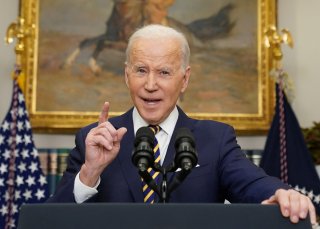White House Nixes Plan to Provide 'Gas Cards' to Americans
The Biden administration decided that it wasn't an "administratively feasible solution."
Gas prices, which rose throughout 2021 and the early part of 2022, have gotten even higher in recent weeks, mostly due to Russia’s invasion of Ukraine. And throughout the price surge, the White House has seemingly been at a loss for how to handle the spike and the political consequences it will likely have.
Now, there are reports that the White House considered a unique idea for dealing with the gas price problem. Axios reported over the weekend that a proposal was floated to have the Internal Revenue Service (IRS) send gas cards directly to Americans. The gas cards would have been part of a larger legislative package to deal with gas prices.
However, some House Democrats strongly opposed the idea. Some opponents argued that it would be expensive and hard to target, could worsen inflation, and “would be a slow process that could bog down the IRS in the middle of the filing season, potentially delaying people's tax returns.”
The White House indicated to Axios that the idea didn’t progress particularly far. “There’s a variety of ideas being discussed to ensure that the costs American families are feeling at the pump are as minimal as possible," the White House’s Vedant Patel told Axios. “However, gas cards being sent to the American people is not seriously under consideration. It is not an administratively feasible solution and the Biden administration is not considering this as a serious option to help American families.”
CNN also confirmed that the idea was proposed and rejected. Other issues raised, per CNN’s report, included fraud concerns and the possibility that the cards would be stolen from recipients’ mailboxes. This has happened in the past with stimulus checks and other government payments.
However, according to Axios, there is another idea being considered: stimulus checks. It’s not clear how much would be provided, nor to whom they would be sent. Other ideas include suspending the federal gas tax, raising “taxes on oil companies to fund means-tested assistance,” and implementing a federal rebate when gas exceeds $4 per gallon.
AAA, in its weekly report, said that average gas prices have begun to come down from the highs of last week. The average is now $4.25 a gallon, which is down from $4.33 last week.
“Usually this time of year, with warmer weather and longer days, we’d see an uptick in gasoline demand as more people hit the road,” Andrew Gross, AAA’s spokesperson, said in the report. “But we had a slight drop in demand last week, which may be due to higher pump prices.”
GasBuddy's report on Monday also found that the average is dropping everywhere besides the West Coast.
Stephen Silver, a technology writer for The National Interest, is a journalist, essayist and film critic, who is also a contributor to The Philadelphia Inquirer, Philly Voice, Philadelphia Weekly, the Jewish Telegraphic Agency, Living Life Fearless, Backstage magazine, Broad Street Review and Splice Today. The co-founder of the Philadelphia Film Critics Circle, Stephen lives in suburban Philadelphia with his wife and two sons. Follow him on Twitter at @StephenSilver.
Image: Reuters

